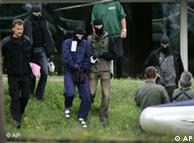Terrorism | 22.10.2008
Terrorist Video Highlights Threat From Fringe Islamic Converts
German police said they've discovered a video by a German convert to radical Islamism saying he's ready to wage jihad in Afghanistan. How typical -- and how threatening -- are converts like Eric Breininger?
Officials from Germany's Federal Office of Criminal Investigation (BKA) confirmed on Wednesday, Oct.22, that the six minute video of Breininger, who is wanted as a suspected member of a terrorist group, was indeed genuine.
"We assume that came from the International Jihad Union (IJU)," a BKA spokesperson told the dpa news agency. The IJU is a radical Islamist organization that originated in Uzbekistan and has been linked with attempted terrorist acts in Germany
Four weeks ago, the BKA launched a public search for Breiniger after rumors surfaced that he was in the Balkans and on his way back to Germany. But they withdrew the warning over the weekend.
Also on Wednesday, Oct 22, the police also arrested the younger brother of one of three men accused of planning attacks last year on US citizens and interests using chemical-filled drums, The 21-year-old Turk, named only as Burhan Y., was arrested at Langen south of Frankfurt and is a suspected helper for the banned IJU.
"Germany should expect attacks"
In the video, the 21-year-old Breininger discussed his whereabouts and motivation.
"I am located in Afghanistan and am not personally planning an attack on Germany," Breininger said in the video, before adding: "We declare war on every country that fights alongside America against Muslims."
But Breininger also said that as long as German soldiers are in Afghanistan and Uzbekistan, “Germany should expect attacks," without giving any further details.
Shown in the video wearing a turban and carrying a Kalashnikov, Breininger hinted that he may be preparing to sacrifice his life for his cause.
"If Allah wishes, he will call me to him as a jidhadi," he said.
So how did a young man from a suburban town in Southern Germany become a fanatic apparently willing to die for his religious beliefs in Afghanistan?
Fateful turn
 Bildunterschrift: Großansicht des Bildes mit der Bildunterschrift: A poster published by Germany's Federal Office of Criminal Investigation shows Eric Breininger
Bildunterschrift: Großansicht des Bildes mit der Bildunterschrift: A poster published by Germany's Federal Office of Criminal Investigation shows Eric Breininger
According to various reports in the German media, Breininger's parents divorced when he was an adolescent, and he reportedly started using hashish and alcohol at a relatively early age. He was prone to getting into fights and had trouble with the police.
In late 2006, Breininger got a job for a package-delivery company, where he met a Pakistani who got him interested in radical Islam. A short time later, he also became friends with a radical Islamic convert named Daniel Schneider.
Breininger began calling himself Abdul Ghaffar el Almani, avoiding his old friends and burning his CDs. He swore off drugs and alcohol. He married in a mosque, and his wife Eva P. wore a veil. The marriage was short-lived.
"He wanted me to clean and cook and said he was looking for another woman," Eva P. later said in a television interview.
In June 2007, Breininger sold off most of his belongings on ebay, saying he wanted to go abroad and learn Arabic, and moved in with Schneider.
In September, Schneider, who had relocated to the Western German region of Sauerland, was arrested along with two other suspected Islamists for allegedly trying to make car bombs and planning attacks on US targets in Germany. Breininger disappeared before police could detain him.
Police suspect Breininger has since received training in a terrorist camp, possibly in Pakistan. Both German and American military forces in Afghanistan are reported to have distributed pictures of him, warning that he is a potential suicide attacker.
How big a danger?
The Breininger case raises the question of how great a threat German converts to Islam pose.
 Bildunterschrift: Großansicht des Bildes mit der Bildunterschrift: Police arrested a suspected member of the so-called "Sauerland terror group" last year
Bildunterschrift: Großansicht des Bildes mit der Bildunterschrift: Police arrested a suspected member of the so-called "Sauerland terror group" last year
"Converts can be more easily radicalized," Kai Hirschmann of Germany's Institute for Terrorism Research and Study told a Internet news site around the time of Scheider's arrest.
"As 'novices' they try to be more religious than even the religious leaders," Hirschmann added. "That often makes them especially fanatical and also especially dangerous."
Other experts, however, disagree with that assessment.
"You can't say that conversion to Islam carries an explicit tendency toward becoming a radical," Stefan Reichmuth, professor of Islamic Studies at the University of Bochum told DW-WORLD.DE.
Estimates of the number of German converts to Islam range between 15,000 and 80,000. But Germany's Muslim league says that, of them, only about 25 fit the description of being radical or dangerously fanatic.
Germany, which opposed the 2003 US-led invasion of Iraq and has more than 3,000 troops in Afghanistan under NATO command, has tightened security and surveillance in response to the threat of attacks by Islamic extremists.
The closest Germany came to an attack was in July 2006 when suitcases containing homemade bombs were placed on two regional trains passing through Cologne's busy main train station. They failed to detonate.
The September 11, 2001 attacks on the United States were planned by an al-Qaeda cell in the northern German city of Hamburg led by Mohammed Atta, one of the hijackers of the planes involved in the attacks.

Comments